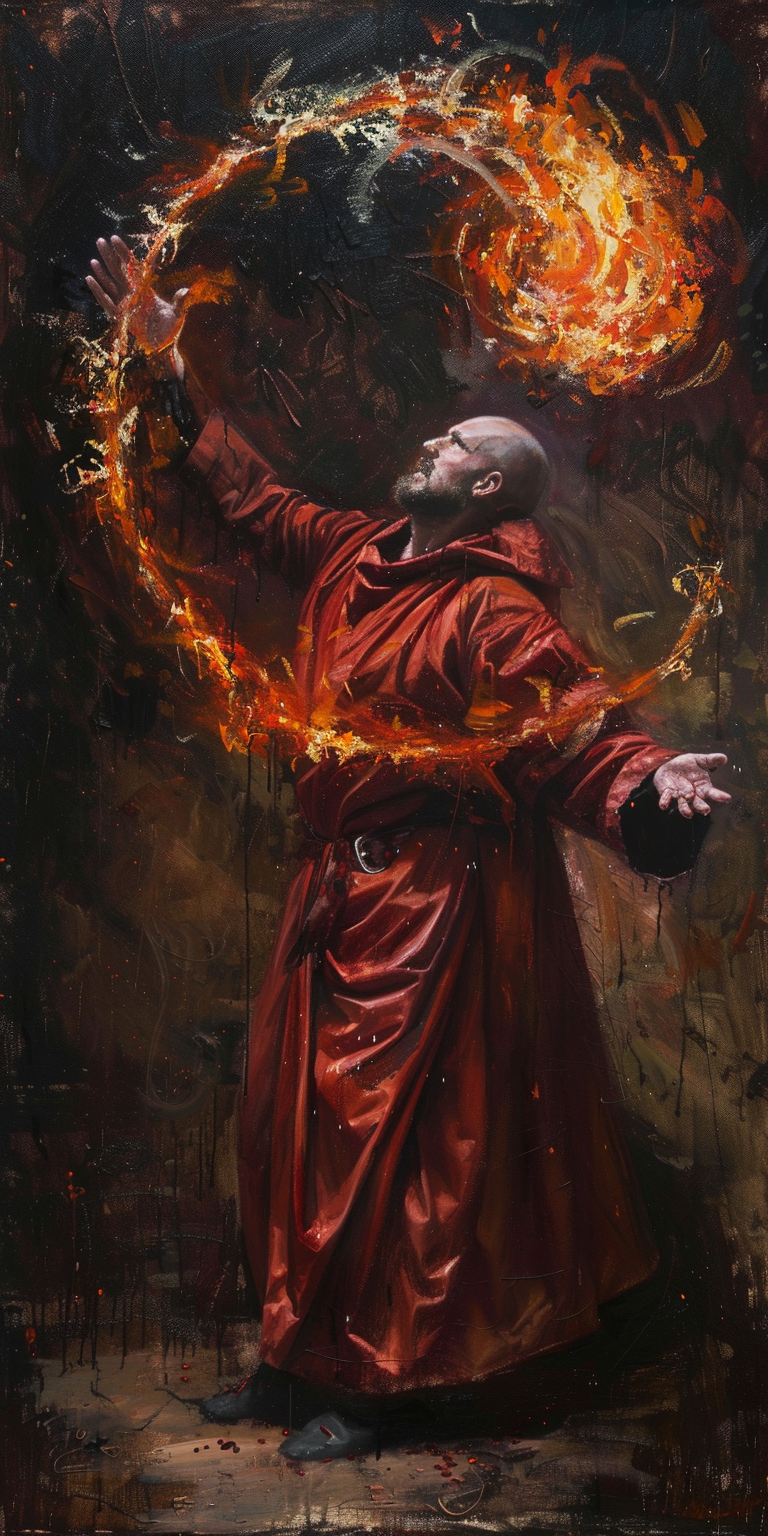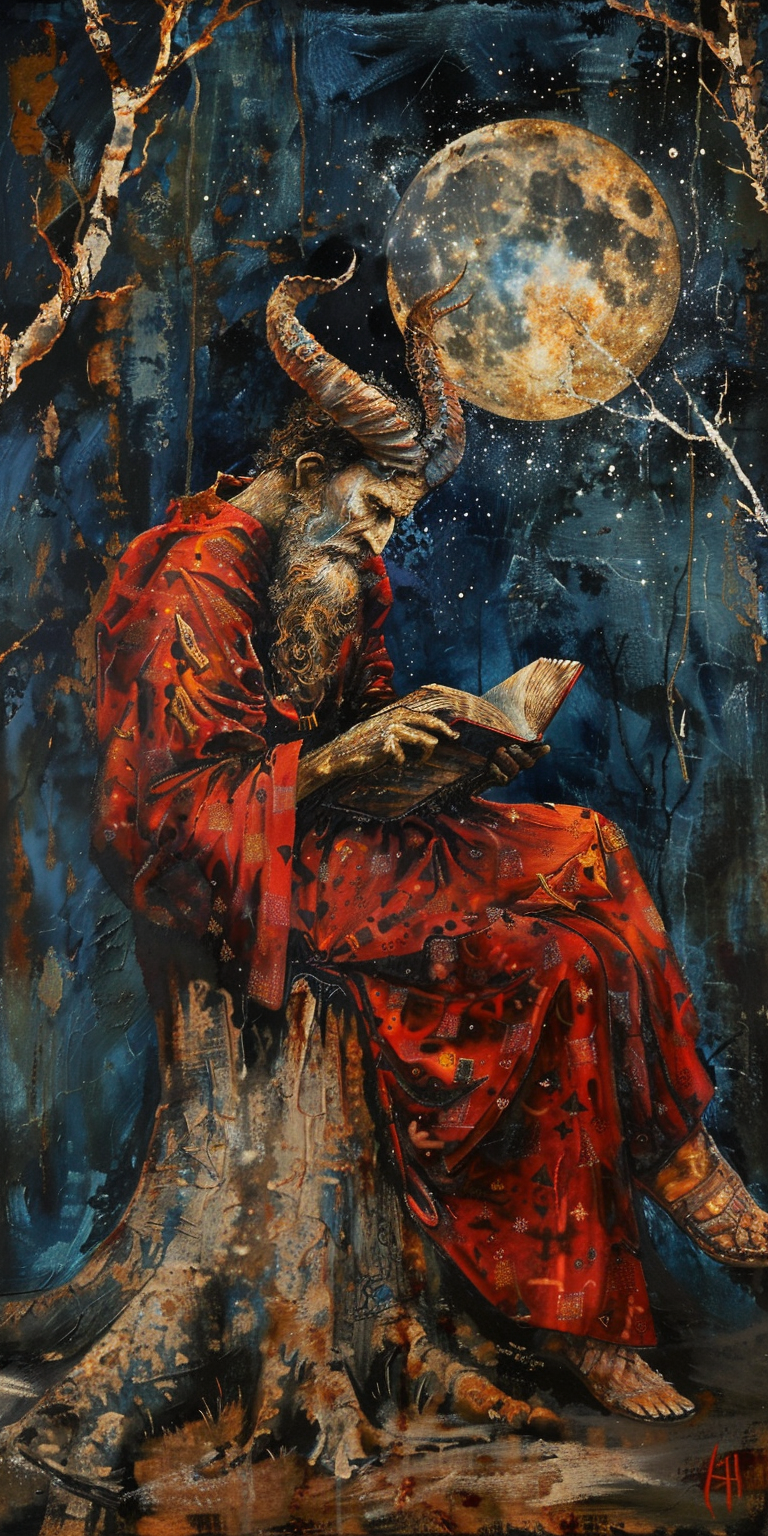Monastic Order of the Eldursteries
The monks of the Eldursteries reside in the western mountain range of Eldurgrund, where they toil away preserving and developing the nation's archives. Developed shortly after the formation of the Eldur Knights (ca. 760-790 EG), the order of monks was tasked with studying and creating fire magic techniques to standardize education on the subject. Their original imperative ensured the dominance of Euvurcrest over the surrounding region but generations of imperialization, regulation, and access to magic weapons have caused the organization to diversify its goals in the modern era.
Today, the Eldursteries transcribe current events, research diverse fields, partake in political relations, perform specialty tasks for the government, and continue developing fire magic. The organization has slowly developed new ranks and responsibilities to improve productivity, though stratification has unfortunately introduced politically driven decisions and a drive for members to strive for personal gain. While modernization has certainly had unintended consequences for the Eldur Monks, it persists as one of the greatest scholarly entities in the Augury, only matched by the Rembrandts of Fjordstrond.
At present (ca. 1962 NG), the Eldursteries have begun aligning more with the national religions associated with the Elduri Mythos, though they fundamentally consider themselves a nonreligious group. However, some members have been reported to have performed research on, revered, or even worshipped Anoch Athylis: a forsaken devil under the imperial Augury. Both the Augury and Eldurgrund credit Anoch Athylis as a supernatural entity, but Eldurgrund attributes him with the deliverance of fire magic upon humanity. In contrast, the Augury claims Anoch Athylis is evil due to his conversion to a devil of famine by Milin Orphi.
The monks are broken into several disciplines, each requiring knowledge of contemporary history and adept literacy. The organization is dominated by individuals from greater noble, lesser noble, and Elduri national families. Since most lordship inheritors are first-born individuals, the Eldursteries are filled with young nobles, each of whom wants to find their own way to develop political power outside the bounds of inheritance; even so, several individuals outside of Eldurgrund have managed to join the organization. For example, orcs of the Greylends and Half Folk (such as centaurs or satyrs) have joined the monkhood.
The Eldur Monks have mastered every discipline, though it's also their task to ensure future monks are fully informed of new developments within the disciplines. Generally, Eldur Monks spend their days managing the Eldursteries, engaging with high-profile individuals, directing monks, and assessing profound findings.
The Eldursteries formed during Ettermiddag with the intent of studying the intricacies of fire magic. As the dominant source of power for the Eldur Knights (the dominant military force at the time), developing techniques was essential to reconquering the territory lost during the dark ages. Thanks to the dozens of monks developing, recording, and teaching fire magic, the military could be efficiently trained without spending valuable time on menial tasks themselves. The organization persisted as a vault of power until a terrible fire rendered the monasteries uninhabitable in the year 1015 DY, ironically due to the very subject matter they were intended to study. While most of the surviving monks were well-versed on techniques of fire magic, fewer had memorized historical documents that were lost. At the time of the fire, the monasteries and records were made with products of the Lyslure Woods which catches with ease; the disaster prompted the organization to begin recording on stone tablets: an iconic feature of the Eldursteries today. A few years down the line, the monasteries were moved up the mountains rather than at their bases. The movement served to mirror the city of Euvurcrest while also ensuring they would be defensible in times of war (an impending threat as seen in The Rembrandtic Wars , ca. 1172 DY).
The Rembrandtic Wars, which saw the Eldurgrund Empire clash with the eastern Saltkrigere Empire, ended in the defeat of Eldurgrund and the complete domination of Trinen by the forces of Shellbay. A major facet of Shellbay's victory came from the siege and capture of the Eldursteries. Saltkrigere General Elias Rembrandt figured the Eldursteries would be relatively easy to capture compared to Euvurcrest while still delivering a substantial blow to national morale. His assumptions were correct, but several unintended benefits came from capturing the Eldursteries. For example, studying tablets allowed the military to anticipate Elduri tactics. Further, the Saltkrigere were able to recover several letters and records relevant to Eldurgrund military activity. During the occupation, half of the monkhood were slain while the rest were either imprisoned or turned to slavery in service of the occupying forces. Months after the capture, Euvurcrest surrendered and the nation fell under the legislation of the Saltkrigere Empire.
Under the Saltkrigere Empire, the organization was suppressed. Fire magic was banned and records were confiscated by the authorities, leaving the monks to serve a purely cultural role in the nation. With funding from Eldurgrund no longer able to support the organization, most monks took to scribing for lords and nobles and using the acquired funds to keep the monkhood afloat. This dictatorial treatment continued for years after the collapse of the Saltkrigere Empire when the new imperial force known as the Augury took power. However, in the year 1573 Md, the military and fire magic ban was lifted. Finally able to study fire magic again, the Eldursteries subsisted on the services they provided to Eldurgrund until innovation began to slow in the coming decades. Once the new order of Eldur Knights was trained and techniques were broadly known, the advent of disciplines was finally formed. History and fire were the first to develop, as they were the main tasks performed by the Eldursteries following the lift of the military ban. To maintain relevance, the discipline of relations was made with assistance from the Euvurcrest Bard's College. The discipline of planes formed in the year 1764 MD in the blooming years of interplanar research. Great strides were made that even assisted the Company of Foolhardy Heroes in understanding how to prevent invasions from extraplanar entities. Unfortunately, undisclosed actions by the Company led to the removal of Laminarum from the planescape and completely cut off access to other planes, leaving the discipline unable to study their subject of interest. Thankfully, in recent years (ca. 1947 NG), reconnection to the planes has been slowly redeveloping.
Organization
Fire
History
Relations
Planes
Overview
In the early days of the Eldursteries, long before the differentiation of disciplines, Eldurgrund was ruled by the didactic masters of fire magic. Many equated the Eldur Monks as mules to carry the greater Eldur Knights to power, but the political access attained by the monks meant that they could curb the nation's destiny however they pleased. The earliest Eldur Monk can be credited with creating the nation's foundations from the margins of society, as not even names to their credit persisted to the modern era.
Over generations, the influence of the Eldur Monks waned, leading to a diversification of disciplines to maintain their value. When the power of Eldurgrund was consolidated following Ettermiddag, many Eldur Monks grew complacent until they were conquered by the Saltkrigere Empire, who forced the organization to serve as a cultural facility by banning fire magic.
Today, the discipline of fire has been allowed to continue, but as the field grows well-understood, they have grown complacent once more. In the past, simple experimentation with techniques was sufficient for groundbreaking discovery but no longer. Today, researchers need the assistance of specialized equipment, divination magic, foreign perspectives, and vast creativity to make noticeable progress in their field. Regardless, fire disciplinaries are perhaps the most utilized for the sake of convenience, as they alone fuel a series of diverse Elduri technology. While it no longer teaches Eldur Knights, the fire disciplinaries have consolidated the Eldursteries as an economic necessity, particularly where nobles are concerned.
Fundamentally essential to all other disciplines, the study and transcription of history allowed the Eldursteries to develop their scholarly visage and popularity. This particular discipline was the first considered worth transcribing in stone, as information regarding fire magic techniques could generally be relearned through other practicing individuals. History, however, often doesn't seem useful until you need the information. This leads to mounds of historical data getting recorded without retrieval for centuries, yet allows for almost any common information to be researched in the future.
The discipline of history shares a unique symbiosis with that of "relations," as the information in the discipline of relations eventually joins the records of history. While relations disciplinaries transcribe current events, those associated with history tend to aggregate external historical records, interpret their own records, and maintain the stone tablets of the Eldursteries. While many often scoff at the value of transcribing hundreds of thousands of words that are rarely used, the records in question have caused breakthroughs in several fields.
It should not be understated that not all monks are objective in their recollection of events. Perhaps unsurprising, given most lower monks are associated with nobility, many individuals attempt to promote the image of their families. Such muddled motivations mean that several individuals must verify and correct records, such that the information remains valid across centuries. This particular concern has led to somewhat convoluted records of historical events, corrections of historical events, and commentary on record alterations. At present, parsing Eldurstery records requires knowledge of the methods applied by the discipline.
The discipline of relations is the most politically active and profitable sector in the organization. Monks educated in relations are often hired by nobles, lords, and vassals for debriefs before engaging with each other. In particular, the monks will explain the implications of marriage alliances, land exchanges, and acts of retaliation.
While relations disciplinaries still transcribe current events for their contemporaries, their main contribution is applying available information. Socially, relation monks are the most respected and live the most comfortable lives as a result; as the "low hanging fruit" of the Eldursteries, however, they gain substantial ire from their fellow monks. In contrast to the monks of history or fire who built the foundation of the organization, those in relations are perceived as disproportionately benefiting from relatively little work. Still, relations monks have proven time and time again to be the most useful for the nation.
Ironically, wealth and access to relation monks have resulted in lords shirking their duties of understanding relevant history themselves. It is entirely possible that several conflicts between lordships could be forgotten if relations monks weren't present to explain them; on more than one occasion, old rivalries have been resurrected between families who had lost contact in the past by monks explaining past relations on both sides.
Still, relation monks still have the broadest spectrum when it comes to standards of living. They may get paid well, but some jobs require more work than others; it isn't uncommon for more demanding customers to work them around the clock, and due to their involvement in major disputes, monks occasionally won't get paid at all.
The discipline of planes fills an odd position within the Eldursteries. This discipline formed as a way to study the outer planes of existence, without many answers as to what they would do if they gained access. As the youngest discipline, it officially formed ten years before the Silence, when all access to other planes was cut off. For over a century, the discipline has struggled to justify its existence as most research in the area is impossible. The only way to study outer planes is through old (fallible) records and by questioning denizens of other planes that were stranded in Laminarum when the planes were closed off.
The main entities in question are spirits such as Both the Bonsai or the Ohdaufehl, who both originated from outer planes. Even so, most of these entities are either dangerous, enigmatic, or self-serving; justifiable, given they were imprisoned in a foreign environment. At present, most plane disciplinaries are focused on learning the principles Planar Expulsion: the method by which the Company of Foolhardy Heroes saved Laminarum from extraplanar invasions.
Members of the discipline are typically pitied, as its members are often nobles or lay folk who were enchanted by the stories of the outer planes and the stories of good and evil, yet eventually find themselves parsing philosophical notes and obscure quotes from history. Still, a few discoveries regarding Planar Expulsion have been made over time; in fact, contemporary planer disciplinaries (ca. 1947 NG) believe that Laminarum is slowly rejoining the planescape.
The Eldursteries have four fields of study: fire, history, relations, and planes. Initially created with the singular discipline of fire, stratification eventually occurred in attempts to keep the organization relevant in times of cultural, economic, or regulatory crises. From the outside view, having only four fields appears claustrophobic, yet nearly every topic can be investigated by its members (so long as its purpose can be justified in the investigation proposal).
Most monks can only be expected to study one discipline themselves, yet some push the bounds of expectation and master all four; these individuals are known as Eldur Monks. To master every discipline is a lifelong task but the process crafts extraordinary leaders for the Eldursteries. However, to be an exceptional mind, one mustn't be an Eldur Monk. Most monks of the Eldursteries have high expectations placed upon them and are second to none in their fields, making them common consultants for the Eldurgrund government, scholarly institutions, and independent researchers.
The Eldursteries have four fields of study: fire, history, relations, and planes. Initially created with the singular discipline of fire, stratification eventually occurred in attempts to keep the organization relevant in times of cultural, economic, or regulatory crises. From the outside view, having only four fields appears claustrophobic, yet nearly every topic can be investigated by its members (so long as its purpose can be justified in the investigation proposal).
Most monks can only be expected to study one discipline themselves, yet some push the bounds of expectation and master all four; these individuals are known as Eldur Monks. To master every discipline is a lifelong task but the process crafts extraordinary leaders for the Eldursteries. However, to be an exceptional mind, one mustn't be an Eldur Monk. Most monks of the Eldursteries have high expectations placed upon them and are second to none in their fields, making them common consultants for the Eldurgrund government, scholarly institutions, and independent researchers.
Roles
The Eldursteries have three broad roles: Workmen, monks, and Eldur Monks. While workmen aren't part of the order itself, they allow all tasks to run smoothly and at the convenience of its members. The details of each are outlined below. Workmen: Workmen perform all maintenance on the Eldursteries, predominately cooking, cleaning, repairing, and making deliveries. Unfortunately, they serve as the unsung heroes of the Eldursteries. While none of the organization's groundbreaking work could occur if its members were preoccupied with menial tasks, virtually no credit (aside from financial compensation) is given to the workmen; most are exchanged or otherwise replaced with individuals from surrounding lordships regularly. While Eldurgrund has little regulation with regard to its peasantry and their standards of living, the Eldursteries are a monument of employment for the surrounding territories. Most workmen are either from the surrounding lordships or previously lived on their own accord, but the Eldursteries provide decent pay and housing for any willing to work. Further, the funding to pay the workmen comes from the governy of Eldurgrund, making a stable source of capital. Monks: Monks of the Eldursteries focus on one discipline, working on their own research and performing tasks as delegated by the discipline's leader (an Eldur Monk). The tasks performed heavily depend on the corresponding discipline, but there are a few prominent examples. History disciplinaries often transcribe and maintain historical records, while occasionally parsing records to assist researchers. Fire disciplinaries are often sent to lordships and Euvurcrest to use fire magic technology that many settlements have grown dependent upon. Relations disciplinaries are hired to resolve lordship disputes and guide political decisions. Planes disciplinaries are often occupied in dense research, but may occasionally serve religious organizations or venture to speak with interplanar entities (such as Both the Bonsai, Vestergil, or Ghattadon). Eldur Monks: Eldur Monks are the leaders of the organization and masters of every discipline. Individual Eldur Monks will lead a specific discipline and organize labor, funds, research, and political action. Together, the Eldur Monks represent the organization and vie for specific financial investments from the government. While much of their time is spent on politics and steeped in organizational tasks, the Eldur Monks aren't separate from great feats of research. The Eldur Monks consult on almost every task performed by the lesser monks and continue to spearhead their own studies. While every Eldur Monk tends to prefer a specific field, their unanimous knowledge of every discipline ensures that they can confidently lead an array of studies.History
Role in Society
The role of the Eldursteries has changed drastically throughout the nation's history. The monkhood initially served as a subsidiary of the militant government, developing fire magic, writing letters, and producing propaganda; of course, the Eldurgrund government has changed drastically after their assimilation into the Saltkrigere Empire, transfer into the Augury, and throwing of two failed revolutions. Now, the Eldursteries possess a much more altruistic role in the state, offering free services to any who visit their territory. Various services provided are outlined under each discipline but may be provided to anyone from international visitors, local lords, or even the rare peasant.
Since the governy provides funding, there's never a need to pay for the services of the Eldursteries, though the expectation of pay has still swayed priority amongst tasks. For example, lordships will often house, feed, and pay any monks who assist them and wealthy researchers will bribe their way into being prioritized.
Such substantial records and devotion to objectivity have made them renowned worldwide, as the stone archives have yet to be matched by other curators. More than records have given the Eldursteries their name, however, as the fire monks have substantial influence over the comfort of nobles in Euvurcrest. Whether it's the Elduri Fire Piping that heats homes and lights streets or the wiring system that notifies guards of criminal activity, the lack of monk activity would substantially lower the capitol's quality of life.
While often objective in their work, the monks still use their power to maneuver a better position for themselves. On some occasions, the monks have even leveraged their handling of relations between lordships to ensure that their funding would increase. Some rumors even state that the Eldur Monks leveraged the outcome of The Scramble in exchange for full access to Both the Bonsai, without having to ask permission of the Hellstrom Governy (or other ruling organizations in perpetuity).
Some rumors even place the Eldursteries as a driving force behind the muted rise in Anoch Athylis worship but this is often considered a peasant's tall tale, as they the monks as far more mysterious and enigmatic than they actually are. Still, pieces of evidence exist. Given that the Eldursteries are the only organization allowed to possess idols to the devils, it is feasible that worship takes place behind its walls (and could be provided to outsiders for a price).
Most monks still subscribe to the rest of the Elduri Mythos and it can't be denied that Anoch fills an essential role in the mythos, but external scrutiny from the Augury would make devil worship troublesome. Regardless, the Eldursteries only owe allegiance to the people of Eldurgrund and its government, requiring no formal devotion to any particular church, aside from where required by the imperial Augury.

Founding Date
948
Type
Religious, Monastic Order
Capital
Demonym
Eldur Monks
Ruling Organization
Location
Controlled Territories
Related Species







Note on the tabs: The "overview" tab is essentially meant to function as a "collapse" tab as well. The other tabs hide information in the article below, which so far as I have been able to manage can not be resolved through CSS outside of a collapse tab.